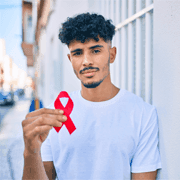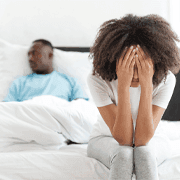SEXUAL PROBLEM: How Long Should You Wait to Have Sex After Your Period
In This Article
SEXUAL PROBLEM: How Long Should You Wait to Have Sex After Your Period
Sreemoyee
Updated on February 01, 2024
Medically verified by Dr. Arya
Fact checked by Sreemoyee

Wellness
10 min read
As we all know, pregnancy planning is a mammoth task.
Knowing when you're most fertile and understanding early signs of pregnancy are two steps to begin with.
On this journey, many women wonder, "How long should I wait to have sex after my period?"
Mykare health is here to help you explore the factors that influence this decision. And provide you with some useful information.
Let’s begin.
Safe Periods and Pregnancy Risk
Getting pregnant just after your period is not impossible. But it is not highly expected. Also, a woman can conceive at any time during her menstrual cycle. And that could be right after her period.
Safe periods depend on cycle length. And shorter cycles generally means earlier ovulation.
There's no such ‘safe’ time for unprotected sex. Fertility varies throughout the cycle.
Is Sex During Periods Safe?
Not really. As unprotected sex during periods increases the risk of infection. From skin-to-skin genital contact and vaginal discharge.
Birth control measures like condoms can lower infection and pregnancy risks.
Also, there are certain benefits of protected sex during periods. Like, relief from menstrual cramps and better lubrication.
Understanding Menstrual Cycles
Before we tell you about how to get your period after sex, let's understand the menstrual cycle.
It's important to know that usually a menstrual cycle lasts about 28 days, although it can vary from person to person.
| Stage | Days in Cycle | Fertility |
|---|---|---|
| Menstruation | 1-7 | Least fertile |
| Post-Menstruation | 8-9 | Possible to conceive |
| Days Around Ovulation | 10-14 | Most fertile |
| Post-Ovulation | 15-16 | Possible to conceive |
| Thickening of Uterine Lining | 17-28 | Less fertile, unlikely to conceive |
Safe Days After Your Period
One common question is, ‘How many days after my period can I get pregnant?’
Well, that depends on various factors, like the length of your menstrual cycle.
With a regular menstrual cycle, you have more chances to get pregnant during the 10th-14th day. Day 1 being the onset of menstruation.
Please note that these days can vary among women.
Sperm can survive in a woman's body for 5-7 days. Unprotected sex during this window too could cause pregnancy.
Early Signs of Pregnancy
No three women can have similar early pregnancy signs. It varies from one to another.
Spotting, fatigue, increased urination, vulva changes, breast and nipple changes, and food cravings are some of the initial signs.
If you miss your periods, you may consider that as a vital sign of early pregnancy.
When to Take a Pregnancy Test
-
The best time to take a pregnancy test is on the first day of a missed period.
-
Testing too early can give less accurate results.
-
Some tests may detect it early, but there’s no guarantee on the accuracy. It may or may not be accurate.
-
Blood tests by a healthcare provider are more accurate than home tests. Mykare Health can make arrangements for you.
How Pregnancy Tests Work
-
Pregnancy tests can spot the hormone human chorionic gonadotropin (HCG) in urine.
-
Significant increase in HCG levels happens when one is pregnant.
-
The tests use urine to determine HCG presence.
-
There are higher HCG concentrations in the morning. Hence, it is advised to take the urine test in the morning after you wake up.
-
Drinking excess water before the test may dilute HCG levels, affecting accuracy.
Effectiveness of Home Pregnancy Tests
Home pregnancy tests are generally accurate when used correctly.
Most claim 97% to 99% accuracy.
Repeat the test in case you get a negative result but still suspect pregnancy.
Blood tests by healthcare providers give higher accuracy.
Preventing Pregnancy
Condoms, female condoms, diaphragms, contraceptive pills, and cervical caps can help prevent pregnancy. Condoms also protect you from Sexually Transmitted Diseases
 7 min read
7 min readPhysical Fitness and Sexual Health: How Exercise Boosts Your Sexual Life
 7 min read
7 min readSexually Transmitted Diseases: Types, Symptoms, Treatment
 14 min read
14 min readHow to Avoid Pregnancy After Sex
Get a Callback Now
How to Get Your Period After Sex
Have you had sex recently and are waiting to get your periods? And this window seems to last too long?
Well you’re not alone. Getting your period after having sex is an important aspect of a woman's reproductive health.
Why? Because, it can signify that everything is functioning as it should.
Mykare Health is here to help you explore what you need to know about getting your period after sex, why it's crucial. And what to do if it's delayed.
Importance of Regular Periods
Having regular periods is a sign that you have a healthy reproductive system.
Reproductive Health: Regular periods are a sign that your reproductive system is running in perfect order.
Hormonal Balance: They indicate that your hormone levels are in check, which is a necessity for overall wellness.
Fertility Awareness: Tracking your periods helps you understand your fertility and plan for pregnancy.
Detecting Issues: Irregular periods can be a sign of underlying health problems that need attention.
Bone Health: Consistent menstruation leads to maintaining strong and healthy bones.
Heart Health: Irregular periods may increase the risk of heart-related issues. If you’re getting regular periods, it means your cardiovascular health is secure.
Mental Well-being: Predictable periods can reduce stress and anxiety associated with menstrual irregularities.
Quality of Life: Regular periods lead to a more predictable and comfortable life during your menstrual cycle.
Menstrual Disorders: Identifying irregularities early can help diagnose and manage conditions like PCOS or endometriosis.
Reproductive Planning: Understanding your cycle is essential for family planning and contraception.
Can You Get Pregnant and Still Have Your Period?
While a lot of people tend to believe that you can't get pregnant if you're on your periods, that’s a myth. The chance is less, but it's not impossible.
Sperm lives for about 7 days in the female reproductive tract. So, if you have a short menstrual cycle, you will have to be more cautious.
How Soon After Sex Can You Expect Your Period?
The timing of your period after having sex can vary.
You can get your periods within the regular cycle length. In case you don’t, there could be a chance of pregnancy, in case you have had unprotected sex.
So, it's better to go for a pregnancy test.
Reasons for Delayed Periods After Sex
What can cause a delay in the period after sex? Here they are:
Pregnancy: The most obvious reason is pregnancy. If contraception wasn't used, a delayed period could signal pregnancy.
Stress: Increasing stress can mess up your hormonal balance. This can delay your periods.
Hormonal Changes: In case you have any issues like polycystic ovary syndrome (PCOS) or thyroid , causing hormone fluctuations, your period may be delayed.
Excessive Exercise: Intense workouts or sudden increases in physical activity can sometimes delay periods.
Weight Changes: Significant weight loss or gain can impact your menstrual cycle.
Medications: Certain medications, including birth control, can influence your menstrual cycle.
Illness: Infections or illnesses can disrupt your body's regular processes, including your period.
Menopause: If you're approaching menopause, irregular periods and delays are common.
Travel: Sudden changes in time zones and disrupted routines can affect your cycle temporarily.
In case you smoke or drink a little too much alcohol and have poor nutrition, your period may get delayed.
In case of delayed periods, please consult an expert to find out what could be the cause. Mykare Health can help you get connected with experts.
Tips to Help Get Your Period After Sex
If your period is delayed, there are some steps you can take to help regulate your menstrual cycle:
Have a Healthy Lifestyle: Eat well, exercise daily and get enough sleep.
Manage your stress levels: Do yoga and keep your stress level in check.
Maintain healthy body weight: Excessive loss or gain of weight could impact your menstrual cycle. So, make sure to maintain a healthy body weight.
Get in touch with a healthcare provider: In case of delayed periods, please consult an expert to find out what could be the cause. Mykare Health can help you get connected with experts.
Role of Birth Control in Menstrual Regulation
Birth control pills or hormonal intrauterine devices (IUDs), can also help in keeping your menstrual cycle under control . Before opting for any of these, please get it checked with your healthcare provider.
Recognising Signs of Pregnancy
If your period is significantly delayed after having unprotected sex, you should consider taking a pregnancy test.
| Signs of Pregnancy | Description |
|---|---|
| Missed Period | A delayed or missed period is often the first and most obvious sign of pregnancy. |
| Breast Changes | Your breasts may become tender, swollen, or sore. The nipples can darken and become more sensitive. |
| Fatigue | Increased tiredness and a need for more rest can be a symptom of early pregnancy. |
| Frequent Urination | You may find yourself needing to urinate more frequently than usual, even during the night. |
| Nausea and Morning Sickness | Morning sickness can include nausea and vomiting, but it can occur at any time of the day. |
| Food Aversions or Cravings | Changes in taste preferences, including strong aversions or unusual cravings, are common. |
| Mood Swings | Hormonal changes can lead to mood swings, irritability, and heightened emotions. |
| Slight Bleeding or Spotting | Some women experience light spotting, known as implantation bleeding, early in pregnancy. |
| Heightened Sense of Smell | You might notice that certain smells become more intense or even unpleasant. |
| Basal Body Temperature | Tracking your basal body temperature can reveal a sustained elevated temperature when pregnant. |
The Importance of Regular Check-ups
Regular visits to your healthcare provider are crucial for maintaining good reproductive health. They can help you make informed choices about family planning.
Getting regular periods is essential, especially after sex. In case of any disparities in your menstrual cycle, please feel free to get in touch with an expert.
FAQs
1. Can I get pregnant during my period?
While it's less likely, you can get pregnant during your period, especially if you have a shorter menstrual cycle. Sperm can live inside the female reproductive tract for up to seven days, and eggs can be released from the ovaries 14-16 days before the start of the period.
2. How do I count safe days after my period?
To calculate safe days, start by determining the length of your menstrual cycle, measured from the first day of your period to day 1 of the next. The first week after your period and a week before your next period are generally considered safe. As eggs are not being produced during these times.
3. How do I track ovulation?
You can track ovulation using fertility monitors, ovulation strips, and tracking basal body temperature and cervical mucus changes. These methods can help predict fertile days.
4. Is there a 100% safe time for unprotected sex?
No, there is no guaranteed safe time. While some periods are less fertile than others, contraception is advisable unless you're intentionally planning pregnancy.
Now you know there's no guaranteed ‘safe’ time for unprotected sex. But knowing right about your body can help you make informed choices regarding pregnancy and contraception.
Always consult a healthcare provider for personalised guidance on your reproductive health journey.
Pregnancy planning involves understanding your menstrual cycle and fertility.
Safe periods for unprotected sex vary based on your menstrual cycle length.
Unprotected sex during menstruation increases the risk of infection and should be avoided.
Using birth control measures like condoms can reduce infection and pregnancy risks.
Understanding your menstrual cycle stages can help in timing sex for family planning.
Early signs of pregnancy can vary among women but may include spotting, fatigue, and cravings.
The best time to take a pregnancy test is on the first day of a missed period.
Home pregnancy tests are generally accurate, but blood tests by healthcare providers offer higher accuracy.
Various contraceptive methods, such as condoms and contraceptive pills, can help prevent pregnancy.
Consult a healthcare provider for personalised guidance on reproductive health.
Understanding Menstrual Cycles: Knowing your menstrual cycle, which lasts about 28 days, is essential for tracking your period.
Importance of Regular Periods: Regular periods indicate a healthy reproductive system, hormonal balance, fertility awareness, and can help detect underlying health issues.
Can You Get Pregnant and Still Have Your Period?: While less likely, it's possible to get pregnant if you're still having your period, especially if you have a short cycle.
How Soon After Sex Can You Expect Your Period?: Your period should arrive within your regular cycle length; if not, consider a pregnancy test.
Reasons for Delayed Periods After Sex: Various factors like pregnancy, stress, hormonal changes, excessive exercise, weight changes, medications, illness, menopause, travel, and lifestyle habits can cause period delays.
Tips to Help Get Your Period After Sex: Maintain a healthy lifestyle, manage stress, monitor your weight, consult a healthcare provider for concerns, and explore birth control options for menstrual regulation.
Role of Birth Control in Menstrual Regulation: Certain birth control methods can assist in regulating your periods, but it's best to discuss them with a healthcare provider.
Recognising Signs of Pregnancy: Look out for missed periods, breast changes, fatigue, frequent urination, nausea, food aversions or cravings, mood swings, slight bleeding or spotting, heightened sense of smell, and elevated basal body temperature as poten
The Importance of Regular Check-ups: Regular visits to a healthcare provider are crucial for maintaining reproductive health, addressing concerns, and receiving guidance on family planning.
Consulting a Healthcare Professional: If you're concerned about your menstrual cycle, consult a healthcare provider for personalised guidance and support.



